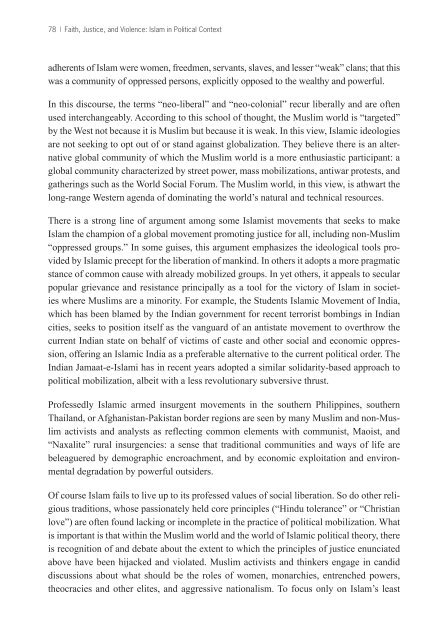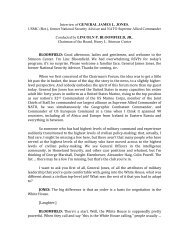Islam and Politics - The Stimson Center
Islam and Politics - The Stimson Center
Islam and Politics - The Stimson Center
You also want an ePaper? Increase the reach of your titles
YUMPU automatically turns print PDFs into web optimized ePapers that Google loves.
78 | Faith, Justice, <strong>and</strong> Violence: <strong>Islam</strong> in Political Context<br />
adherents of <strong>Islam</strong> were women, freedmen, servants, slaves, <strong>and</strong> lesser “weak” clans; that this<br />
was a community of oppressed persons, explicitly opposed to the wealthy <strong>and</strong> powerful.<br />
In this discourse, the terms “neo-liberal” <strong>and</strong> “neo-colonial” recur liberally <strong>and</strong> are often<br />
used interchangeably. According to this school of thought, the Muslim world is “targeted”<br />
by the West not because it is Muslim but because it is weak. In this view, <strong>Islam</strong>ic ideologies<br />
are not seeking to opt out of or st<strong>and</strong> against globalization. <strong>The</strong>y believe there is an alternative<br />
global community of which the Muslim world is a more enthusiastic participant: a<br />
global community characterized by street power, mass mobilizations, antiwar protests, <strong>and</strong><br />
gatherings such as the World Social Forum. <strong>The</strong> Muslim world, in this view, is athwart the<br />
long-range Western agenda of dominating the world’s natural <strong>and</strong> technical resources.<br />
<strong>The</strong>re is a strong line of argument among some <strong>Islam</strong>ist movements that seeks to make<br />
<strong>Islam</strong> the champion of a global movement promoting justice for all, including non-Muslim<br />
“oppressed groups.” In some guises, this argument emphasizes the ideological tools provided<br />
by <strong>Islam</strong>ic precept for the liberation of mankind. In others it adopts a more pragmatic<br />
stance of common cause with already mobilized groups. In yet others, it appeals to secular<br />
popular grievance <strong>and</strong> resistance principally as a tool for the victory of <strong>Islam</strong> in societies<br />
where Muslims are a minority. For example, the Students <strong>Islam</strong>ic Movement of India,<br />
which has been blamed by the Indian government for recent terrorist bombings in Indian<br />
cities, seeks to position itself as the vanguard of an antistate movement to overthrow the<br />
current Indian state on behalf of victims of caste <strong>and</strong> other social <strong>and</strong> economic oppression,<br />
offering an <strong>Islam</strong>ic India as a preferable alternative to the current political order. <strong>The</strong><br />
Indian Jamaat-e-<strong>Islam</strong>i has in recent years adopted a similar solidarity-based approach to<br />
political mobilization, albeit with a less revolutionary subversive thrust.<br />
Professedly <strong>Islam</strong>ic armed insurgent movements in the southern Philippines, southern<br />
Thail<strong>and</strong>, or Afghanistan-Pakistan border regions are seen by many Muslim <strong>and</strong> non-Muslim<br />
activists <strong>and</strong> analysts as reflecting common elements with communist, Maoist, <strong>and</strong><br />
“Naxalite” rural insurgencies: a sense that traditional communities <strong>and</strong> ways of life are<br />
beleaguered by demographic encroachment, <strong>and</strong> by economic exploitation <strong>and</strong> environmental<br />
degradation by powerful outsiders.<br />
Of course <strong>Islam</strong> fails to live up to its professed values of social liberation. So do other religious<br />
traditions, whose passionately held core principles (“Hindu tolerance” or “Christian<br />
love”) are often found lacking or incomplete in the practice of political mobilization. What<br />
is important is that within the Muslim world <strong>and</strong> the world of <strong>Islam</strong>ic political theory, there<br />
is recognition of <strong>and</strong> debate about the extent to which the principles of justice enunciated<br />
above have been hijacked <strong>and</strong> violated. Muslim activists <strong>and</strong> thinkers engage in c<strong>and</strong>id<br />
discussions about what should be the roles of women, monarchies, entrenched powers,<br />
theocracies <strong>and</strong> other elites, <strong>and</strong> aggressive nationalism. To focus only on <strong>Islam</strong>’s least

















